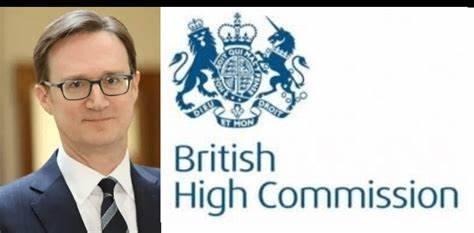BUSINESS

ENVOY SAYS REFORMS ARE TURNING NIGERIA INTO AN INVESTMENT HUB
The British High Commissioner to Nigeria, Richard Montgomery, has praised Nigeria’s ongoing economic reforms, highlighting them as crucial drivers behind the country’s rising status as an investment hub.
Speaking at a press briefing in Abuja on Wednesday, Montgomery emphasized that these reforms are making Nigeria an increasingly appealing destination for foreign investors, especially from the United Kingdom.
He outlined three key focus areas: a positive evaluation of Nigeria’s economic reforms, updates on the UK’s own economic reforms, and a strategic roadmap to strengthen trade and investment ties between the two countries.
Montgomery affirmed that Nigeria’s economic transformation is vital to unlocking greater investment opportunities for both nations.
“First, I want to highlight our positive assessment of the economic reforms and changes underway in Nigeria,” Montgomery said. “These reforms are making Nigeria more investable, and we are seeing strong prospects for Nigeria’s growth.
With the country’s large and growing population, along with its bold economic policies, Nigeria is becoming an increasingly important partner for the UK in Africa.”
The High Commissioner highlighted Nigeria’s decisive actions, including the removal of the fuel subsidy and the unification of the exchange rate system.
Despite the hardships these measures have imposed on ordinary citizens, with inflation lingering near 20 percent, Montgomery conveyed a positive outlook for the future.
“Inflation is still high, around the mid-20 per cent range, and it will take time to bring it down,” he explained. “However, we believe the rate will decrease in the coming months and years. The World Bank’s recent economic update on Nigeria reinforces this positive outlook, showing that Nigeria’s foreign exchange reserves are rising, making the country less risky for investment.”
Montgomery also praised Nigeria’s significant improvement in government revenue collection, which has risen by nearly 90 percent.
He pointed out that this growth is mainly driven by enhanced tax administration rather than an increase in tax rates. According to him, the additional revenue is aiding in reducing fiscal deficits, allowing for increased investment in infrastructure and public services.
“Most importantly, Nigeria’s growth rate has ticked up significantly,” Montgomery remarked. “Between 2015 and 2019, the average growth rate was about 2 per cent, but in the last 12 months, it’s been around 3.5 per cent, and in the most recent quarter, it’s even higher, at 4.6 per cent. These reforms are working, and they are making Nigeria more attractive for business investments.”
Montgomery highlighted how the UK’s economic reforms complement Nigeria’s advancements. He stressed that the UK is creating a more predictable investment climate by implementing measures that simplify regulations and lower the cost of doing business.
“The UK economy has unlocked billions of pounds in investments, particularly in growth sectors like technology, infrastructure, and energy,” he noted.
He also discussed the strategic partnership between Nigeria and the UK, formalized in November 2024 with the signing of a trade and investment agreement.
This partnership aims to promote cooperation across various fields, such as security, defence, foreign policy dialogue, and strengthened trade and investment relations.
Montgomery also provided an overview of the UK’s trade and investment roadmap, identifying priority sectors for collaboration between the two countries, including clean growth, education, health and life sciences, and the creative industries.
He stressed that UK businesses are already making notable progress in Nigeria, especially within the energy, healthcare, and transport sectors.
“In the creative industries, Nigeria’s film and music sectors are growing rapidly,” Montgomery said. “The UK is one of the largest production and market entry points for the global creative industries. We want to harness this growth coming from Nigeria, where we see major opportunities for collaboration.”
The High Commissioner further highlighted the UK’s competitive edge in taxation, pointing out that its corporate tax rate stands at 25 percent—among the lowest within the G7.
He underscored the need for sustained cooperation between Nigeria and the UK, especially through initiatives such as the Enhanced Trade and Investment Partnership. This initiative, he noted, is designed to eliminate non-tariff barriers, streamline regulatory frameworks, and foster long-term, sustainable trade opportunities between both nations.
“We are committed to deepening our engagement with Nigeria,” Montgomery concluded. “This partnership will not only expand trade but will also create tangible value for both our countries.”
Following Montgomery’s remarks, the UK Country Director for the Department for Business and Trade in Nigeria, Mark Smithson, spoke about the growing importance of Nigeria to the UK’s trade agenda.
He emphasised that the UK and Nigeria share a long-standing and dynamic trade relationship, valued at £7.2bn, with Nigeria being the UK’s second-largest trading partner in Africa.
“Nigeria is of immense importance to the UK,” Smithson said. “The Enhanced Trade and Investment Partnership is a co-created document that aims to drive economic expansion, job creation, and business environment reforms in both countries.”
Smithson highlighted key milestones, including the launch of the UK-Nigeria Business Dialogue and the formation of the Creative Industries Working Group.
He encouraged Nigerian businesses to leverage the Developing Countries Trading Scheme to access over 3,000 products tariff-free, fostering greater trade between the two nations.
The Director-General of the Presidential Enabling Business Environment Council, Princess Zahrah Audu, also addressed the gathering, emphasising Nigeria’s commitment to creating a competitive and transparent business environment.
She highlighted the role of PEBEC in driving over 200 business-friendly reforms and its efforts to improve investor confidence in Nigeria.
“Nigeria is focused on creating a more competitive, transparent, and business-friendly environment,” Audu said. “We are working closely with the UK to ensure these reforms lead to tangible results for businesses.”
"This represents a significant development in our ongoing coverage of current events."— Editorial Board









